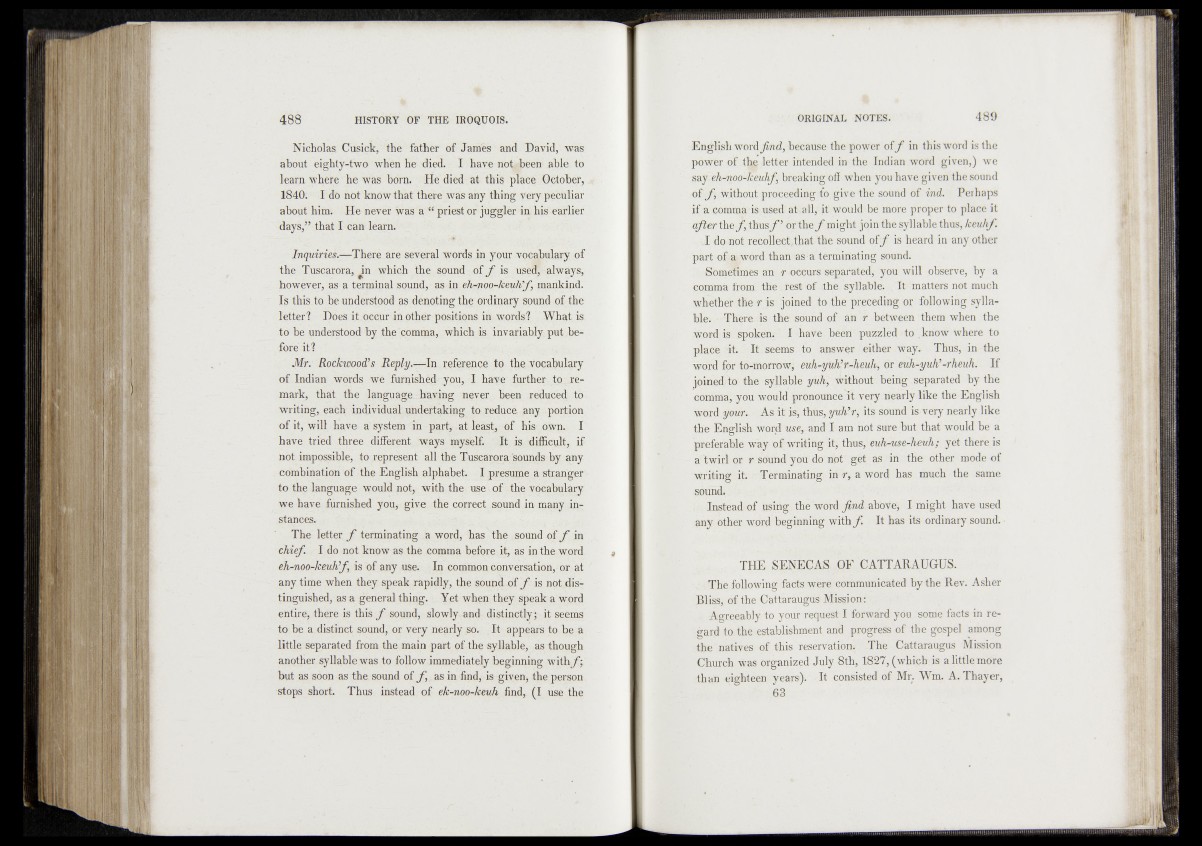
Nicholas; Cusick, the father of Jantes and David, was
about ejghty-two when he died. [ have no^i»benc .able to
learn, whbfe he was Bdrh.$J He died at this place October,
1840. I db not know that there was any thingWUry peculiar
about him. He never Was a “ priest or juggler in his earlier
days*” that I can learn. .
Inquiries.-—There are several words in your ^vocabulary of
the Tusearora, Jn which the sound of f is use™'always,
however, as a terminal sound, as in eh-m o-keuhf, mankind.
Is this to be understood as-denoting the ordinary sound of the
letter? Does it.becur in other positions in/words? What is.
to be understood by the comma, which is invariably put before,
it? |
Mr. Rockwopd’s I?^y.-^In r reference to the vocabulary
of Indian words we furnished-’you, I have further tp^je-
mark, that the language__baving never been reduced to.
writing, each individual undertaking to-reduce- any portion
of it, will have, a' ‘system ’'in part* at least, Of his- oWp.. I
have tried three different, ways myself. vR.jtev difficult, if
not impossible, to represfent all-the Tuscarora sounds by any
combination of the English alphabet. I presume a stranger
to the language would, notf with the. use. of the vocabulary
we have furnished you,- give the correct sound in many instances.
The letter, f terminating a word, has the , sound o f f in
chief. I; do not know as the comma before it, as In the. word
eh-no&-Jceuh’f , is of any use.; In common conversation,- or- at
any time when they speak rapidly, the sound nf f is not,dis-
tinguished, as a general thing.1 Yet when they speak a word
entire? there is this ƒ sound, slowly, and distinctly j it seems
to he a. distinct sound, or very nearly so. . ft appears to be a
little separated from the main part of the syllable, as though
another, syllable was to follow immediately beginning wifh:^
but as soon as the sound of f . as in find, is given* the person,
stops short. Thus instead o f ek-noo-keuh find,. (I use the
•English, wopd^/md, because the power of ƒ in this word is the
. of the letter intended in the Indian word given,) we
sa f'eh^od-W euhf breaking Of! when you have given the sound
of^i without proceeding to, give the sound of ind. Perhaps
if a comma'is: used at-ali, it would be more proper to place it
after th thus ƒ ’ or the f might join the syllable thus, keuhf.
J dp-not, tecefie^ffiat-’tlie sound <&f is heard in any other
part- of jhWord than as a terminating sound.
Sbmemnes an-, r-occurs separated, you will observe, by a
comma from the. rest of -the syllable. It matters not much
whether the r is* joined io the preceding qi; following sylla-
Me. -There is the .sound of an r between them when the
word is Spoken.; I have been' puzzled to know where to
place 'it. It seems lib answer either way. Thus, the
word for to-morrow.; euh-ywKr-heuhb dr euh-yuM-rheuh. If
joined-to the syllable yuh, Without beings separated by the
comma, you would pronounce it very nearly like the English
word your. As if is, tbps, yuh’r, its sound iswery nearly like
the English-woiul user and I am not sure hut that would be a
preferable way of writing itj thus ■ euhmse-hmh; yet there is
a‘"twirl or r sound you do net get as in the other mode of
writing it:; Terminating • in r, a word has much the same
sbund. •
Instead of u sin g , the word jtnd. aboYe^ I might have used
guy ether w.ord beginning with f . It has its ordinary sound.
THE SENECAS- OF CATTARAUG-US.
The following-facts were communicated by the Rev. Asher
Bliss, uf the Gattaraugus Mission:
. Agreeably to your request I forward you some facts in regard'
to. the establishment, and progress of-the gospel among
the natives of this reservation: The Cattaraugus Mission
Church was organized July 8th, 1827, (which is a little more
than eighteen years-)/ It consisted of Mr. Wm. A. Thayer,
* 63 ,